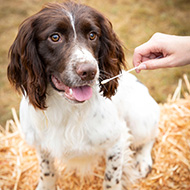
Breed-specific testing available for 80 breeds.
The Kennel Club's new DNA Testing Services has been launched, providing owners with access to genetic health tests that are most relevant for their breed.
Developed by The Kennel Club, in partnership with Weatherbys Scientific, the tests have been created for 80 breeds, and are aimed at any owner considering breeding, or any owner interested in understanding their dog's genetics.
Dr Joanna Ilska, genetics and research manager at The Kennel Club, said: “Research has shown that the number of pedigree dogs at risk of inherited diseases can be dramatically reduced by responsible breeding, thanks to the use of DNA tests.
“We have seen that around ten years after a DNA test becomes available, the frequency of gene mutations that caused the disease in some breeds decreases by a staggering 90 per cent, or more.
“With that in mind, we are delighted to launch The Kennel Club DNA Testing Services, which allow caring breeders and responsible owners to have a genuine and positive impact on the health of future generations of dogs, in an easy, accessible and cost-effective way.
“At the same time, those who use the service will be contributing to driving further understanding of canine genetics and disease, and the development of dog health initiatives, with all data and profits reinvested into research as part of The Kennel Club’s mission of making a difference for dogs.”
Collecting a dog's DNA sample via a cheek swab, the service then checks the DNA for markers associated with breed-relevant disorders. The results for these will be automatically registered on a dog's record, and will be made available on The Kennel Club website.
The DNA Testing Services also offer DNA profiling, providing a unique genetic code for an individual dog, which can be used as a 'genetic fingerprint'.
Further information on the service can be found on The Kennel Club website.
Image (C) The Kennel Club



 The Federation of Independent Veterinary Practices (FIVP) has announced a third season of its podcast, Practice Matters.
The Federation of Independent Veterinary Practices (FIVP) has announced a third season of its podcast, Practice Matters.